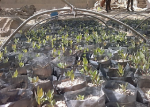The beach is a mecca in Florida where we’re working and playing this spring, and I was swimming and sunning at a huge public beach park on Anna Maria Island in the Gulf of Mexico. With clear skies and temperature in the 80s, it was crowded on Saturday afternoon. Four female friends settled down close by, and it was like being in the next booth. I could hear every word.
“Did ya get the Busch Gardens from me?”
“Yah.”
“It’s 99 dollars for Busch with a free pass to Island Adventure. That’s a good deal.”
“If I had the money I’d buy it. Course, I’d never use the Island Adventure thing.”
“Hey, Island Adventure is free. Whatcha got to lose?”
I imagine sharing this bit of conversation with a student friend from Afghanistan. Could I help her understand that a single, working woman, living paycheck to paycheck, looks forward to spending 100 dollars for one, maybe two, days of entertainment?
To underscore the point, the same woman brought up her next tattoo. “I know what I am getting; I just haven’t decided where to have it.” The tattoos she had encircled her midriff and looked expensive.
My Afghan friends don’t have to explain why there is a backlash against the incursion of western culture into theirs. This goes unspoken while we share our abhorrence of the violence and oppression advocated by some to stave off such materialism. Is it inevitable that modernization along with health care, economic security, public education, and new infrastructure will bring amusement extravaganzas and tatt parlors? Sure, but let is also bring public parks like those of Anna Maria Island, museums, and institutions that preserve traditional values. There’s a lot to lose.











You must be logged in to post a comment.